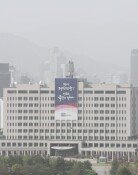China, Russia side with N. Korea
North Koreas Nov. 23 shelling of Yeonpyeong Island has raised tension on the Korean Peninsula, but the situation is being further aggravated by China and Russia. The North must be held accountable for its provocation and concerted efforts are needed to eliminate factors that heighten tension on the peninsula.
North Koreas military threats on the heels of its artillery attack on Yeonpyeong began Pyongyangs irrational rejection of the Northern Limit Line, the de facto inter-Korean maritime border. Behind the inhumane crime that indiscriminately attacked even civilians lies the Kim Jong Il governments ambition to move the sea border southward, despite the border being maintained as is for more than five decades since the end of the Korean War. Seoul must solidify its resolve not to tolerate Pyongyangs attempt to redraw the sea border.
The Northern Limit Line is the historical and virtual inter-Korean sea border drawn by the U.N. Command on Aug. 30, 1953. Though U.N. forces controlled waters and islands surrounding the peninsula, they drew the maritime border in the middle between both Koreas and took it as the Northern Limit Line of South Korean and U.N. forces. Since this was a big concession by U.N. forces, the North raised no objection at the time. Since then, Pyongyang has acknowledged the sea border several times in inter-Korean talks.
In September and October 1983, when the North sent relief supplies by sea to help South Koreans affected by floods, the communist country took over the right to escort its ships to the South on the sea border. Article 10 of the appendix to the 1992 inter-Korean non-aggression pact is another example of the Norths acceptance of the sea border. Sea areas subject to non-aggression are areas that have been under the jurisdiction of each party so far, the article says. The North, however, began full-fledged efforts to nullify the sea border after the Kim Dae-Jung administration of South Korea adopted the sunshine policy of engaging its communist rival. In September 1999, three months after the first inter-Korean naval skirmish, the North unilaterally declared its own maritime border in the Yellow Sea. Pyongyang also triggered the second inter-Korean naval battle in June 2002. In October 2007, North Korean leader Kim invited then South Korean President Roh Moo-hyun to Pyongyang and agreed to designate the Yellow Sea as a joint fishing zone to turn the waters into a peace zone. The recent attack on Yeonpyeong, however, showed that this was fraud.
China and Russia have defended and supported the Norths provocations and unreasonable demands. In the wake of the Norths sinking of the South Korean naval vessel Cheonan in March, Beijing defended Pyongyang at the U.N. Security Council, leading to the adoption of a presidential statement that merely criticized the attack without naming North Korea as the perpetrator. Though Pyongyang defied the council, which urges a halt to the Norths nuclear weapons development, by making public its uranium enrichment facilities, Beijing and Moscow did nothing. In an unprecedented move, however, Russia blasted the North for shelling Yeonpyeong but China failed to do the same.
China and Russia will make a grave mistake if they align themselves with the North in criticizing the South Korean firing drill out of their habitual routine of defending Pyongyang. Beijing and Moscow should be well aware that any interference in the drill in South Korean territorial waters violates the sovereignty of the Republic of Korea. South Korean forces have conducted drills every month in waters near Yeonpyeong, and this drill is also a regular exercise to defend the country. North Korea, China and Russia also conduct their own military drills. Beijings military has been particularly active this year in conducting a maritime shooting drill using live ammunition and a joint army-air force drill in summer. China and Russia would be embarrassed if South Korea urged a halt to their exercises.
On South Koreas exercise, Beijing and Moscow put diplomatic pressure on Seoul by issuing statements first and letting South Korean ambassadors know later. What did the two countries say to the North and through what channels? China and Russia are attempting to hide the truth that the Norths artillery attack on Yeonpyeong has worsened the situation on the peninsula.







